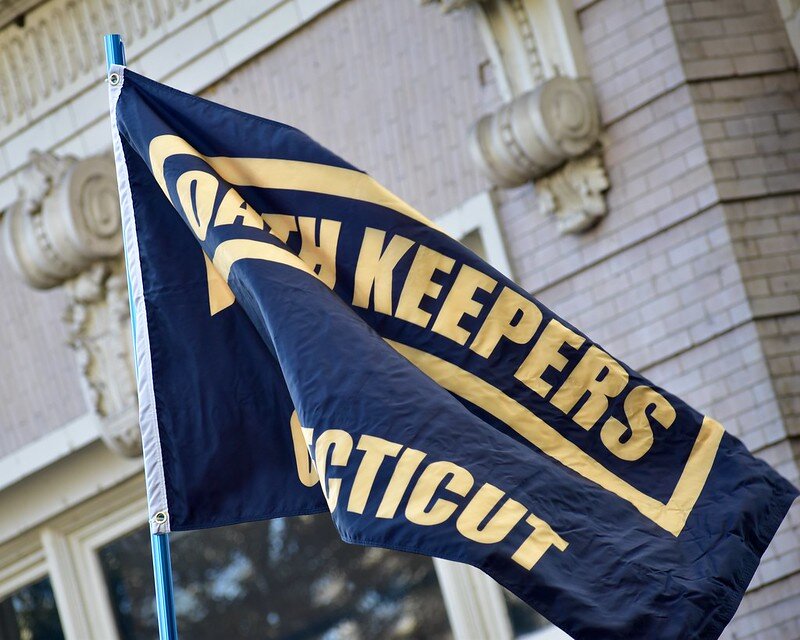Bill Berkowitz for BuzzFlash: Christian Crowdfunding Site Hosts Trump’s Big Lie Grifters, January 6 Rioters, and Kyle Rittenhouse Supporters
January 6 insurrectionists are among Trump supporters raising money on a “free Christian crowdfunding site” (Anthony Crider)
March 26, 2021
By Bill Berkowitz
GiveSendGo advertises itself as the “#1 Free Christian Crowdfunding Site.” It’s website maintains that it is “A place to fund hope. A place to work together with the body of Christ around the world to make a difference.” It raises money for a mélange of individuals and groups. The Gerdsen family is raising money to facilitate an adoption. Diane Sparano is raising money for her daughter Mia’s LD Bell Raiderette Team. The Daniel family is raising money for a Honduras Mission trip. GiveSendGo’s most controversial funding appeal comes from Friends of the Rittenhouse family, raising money for Kyle Rittenhouse, who is charged with fatally shooting Black Lives Matters protesters in Kenosha, Wisconsin last summer. Since the Rittenhouse appeal was posted, it exceeded its $500,000 goal, raising $585, 940.
GiveSendGo has also hosted appeals for money from individuals who attended the January 6 right-wing riot at the Capitol. As of mid-March, Kelly and Connie Meggs, members of the Oath Keepers militia, who were “Dressed in camouflage, … [and] can be seen on security footage illegally entering the Capitol and walking around the building with fellow Oath Keepers.” The Daily Beast reported that the Meggs had raised more than $80,000 on the site. The family of Oath Keeper Kenneth Harrelson “has raised more than $160,000,” The Daily Beast reported..
And, as Richard Salame recently reported, GiveSendGo is also the platform for Trump supporters who are raising money to continue perpetrating the Big Lie, that President Joe Biden stole the election from Donald Trump. “Among the most successful fundraisers is Matthew Braynard, the former director of data and strategy for Trump’s 2016 campaign.”
Braynard started out at GoFundMe, the world’s largest fundraising platform, but he was removed from the platform for violating the site’s terms of service and attempting to “spread misleading information about the election.”
Braynard launched the fundraising effort on November 7, “promising to use the money to ‘detect potentially fraudulent ballots.’ After a week, donations had surpassed the goal of $590,000 that he had set by tens of thousands of dollars, and by mid-January, the campaign had raised more than $675,000 from nearly 9,000 donations.” On its funding page Matt Braynard posted that they had “raised all the money we need.”
According to Salame, “What’s notable about Braynard’s campaign is less the nuances of his particular effort (there’s now an entire cottage industry around claims of election fraud) than how it demonstrates the power of political crowdfunding outside traditional institutional structures like nonprofits and political action committees.”
Founded in 2014 by Jacob Wells and two of his siblings, Emmalie and Heather, the site is more permissive about who it allows to fundraise on it. The site’s terms and conditions note that campaign owners “are not permitted to create a Campaign to raise funds for illegal activities, to cause harm to people or property, or to scam others.”
According to Salame, “All told, individuals and groups alleging widespread election fraud have raised more than $1.2 million on GiveSendGo, according to an analysis of donations by GEN and Type Investigations. Our analysis identified at least 20 crowdfunding campaigns on the site challenging the November election results, alleging voter fraud, and raising funds for individuals who claim to be election integrity whistleblowers.”
The Case of Kyle Rittenhouse
The eighteen-year-old Kyle Rittenhouse, who was 17 at the time, is charged with killing Anthony Huber, 26, and Joseph Rosenbaum, 36, and seriously wounding Gaige Grosskreutz, 26, during protests on Aug. 25, following the police shooting of Jacob Blake, who was left paralyzed. GQ’s Doug Bock Clark has written a piece headlined “American Battlefield: 72 Hours in Kenosha,” which “draws on dozens of hours of video footage, including a comprehensive timeline of crucial events created by syncing 11 livestreams; countless photos; dozens of interviews, including some with participants speaking for the first time; previous reportage; and extensive police and court records. It is the most complete investigation and reconstruction yet of how American order imploded for three nights in Kenosha, until citizens were warring in the streets, and what that breakdown might tell us about the United States’ deepening divisions,”
The Rittenhouse GiveSendGo appeal read: “Kyle Rittenhouse just defended himself from a brutal attack by multiple members of the far-leftist group ANTIFA – the experience was undoubtedly a brutal one, as he was forced to take two lives to defend his own.
“Now, Kyle is being unfairly charged with murder 1, by a DA who seems determined only to capitalize on the political angle of the situation. The situation was clearly self-defense, and Kyle and his family will undoubtedly need money to pay for the legal fees. Let's give back to someone who bravely tried to defend his community.”
In early March, a Wisconsin judge delayed the murder trial of Rittenhouse, who thanks to the generous support by GiveSendGo donors is out on bail. According to NPR’s Vanessa Romo, “Prosecutors as well as Rittenhouse's defense attorneys had asked for the postponement, arguing they needed more time to build their respective cases.”
In early March, Tim Fries, a contributor to Benzinga, reported that PayPal announced they had blocked GiveSendGo, “after they were found to have participated in raising funds for those involved in the [January 6] protest.” Fries noted that Jacob Wells issued a statement saying that “the decision to cut ties with PayPal was mutual, and the platform does not feel responsible for supervising every fundraising campaign that is hosted on their website.
Follow BuzzFlash on @twitter
Continue the conversation at the BuzzFlash Nation group on Facebook

